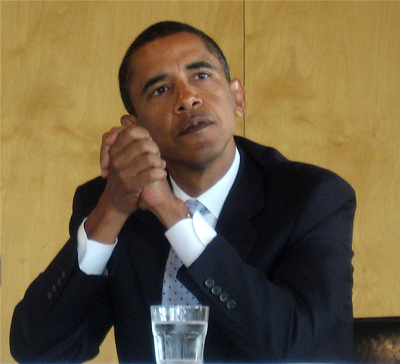Brother, Can You Spare A Trillion Dollars?
Comments (3)
Obama's proposal to freeze one-seventh of the budget while letting the other six-sevenths grow, what he dubiously calls a "spending freeze," can be best summarized in six words.
"It's like what an unsuccessful dieter would order at McDonalds: Big Mac, large fries, Diet Coke," wrote John J. Pitney Jr., Roy P. Crocker professor of American politics at Claremont McKenna College.
The "diet coke" being the freeze on non-security discretionary spending for three years, which he contends will "help put our country on a fiscally sustainable path." In reality, Obama's "spending freeze" only accounts for a fraction of the overall budget and leaves out major money eaters like health care (Medicare and Medicaid), defense, pensions and welfare.
Last year's spending binge will actually leave the overall budget higher than what Obama inherited from Bush, and his projected spending will get progressively worse, according to Cato Scholar Chris Edwards.
Granted, Bush turned out to be an absolute spending whore. (It's impressive the printing machines could keep up with him.) In Bush's last year, FY 2009, the government spent about $2.5 trillion, or $1 trillion more than the administration originally intended. The projected Bush budget would have lead the government to pushing out $2.71 trillion by 2011.
Now Obama wants to raise that number to $3.83 trillion, another trillion more than the egregious Bush spending track. And, of course, Obama's proposed budget only functions as a projection. It leaves no room for "Katrina's" or other unforeseen disasters like a roller coaster economy.
In his statement on the budget, Obama contends his proposed budget "reflects the serious challenges facing the country." He reminds people "we're at war" and that the economy lost 7 million jobs over the last two years.
"Many feared another Great Depression," he said. "So we initiated a rescue, and that rescue was not without significant cost; it added to the deficit as well."
The implication that Obama's policies rescued the country from a Great Depression is like applying the pre-emptive strike concept to the economy. Perhaps the Iraq War prevented a nuclear war -- who knows, maybe weapons of mass destruction are still hiding in depths of middle eastern sand -- and perhaps TARP money stopped a 25 percent unemployment rate. Perhaps the attack on Afghanistan saved New York City from becoming a pile of ash and perhaps lending banks billions of dollars saved 600 of them from collapsing. Perhaps.
But probably not. The health of the economy sits outside the scope of the executive branch's hands. Its rise or fall has little to do with presidential decisions and a lot more to do with external market factors, like bad investments and shady loaning practices.
The country has yet to experience, and will probably never experience, the "great" effects of the more than a trillion dollars in TARP spending. Unemployment remains at a stubborn 10 percent, and in some states like Michigan and California, those numbers are worse. Banks still hold on to billions of dollars intended to boost the economy and open credit lines, or at least the portion they haven't given out to executive bonuses. (It's what happens when the government gives money away with no accountability system.)
What's worse, no one wants to talk about inflation. What happens when credit lines do open? What happens when millions of dollars float around the economy with no goods or services to back it up? If history says anything, it screams CARTER.
Carter faced an 18 percent inflation rate, which invited a speedy end to his presidency. For Obama, only 2012 will tell. He might want to think about making some real budget cuts, and stop the print, print, printing that led to his predecessor's downfall.




